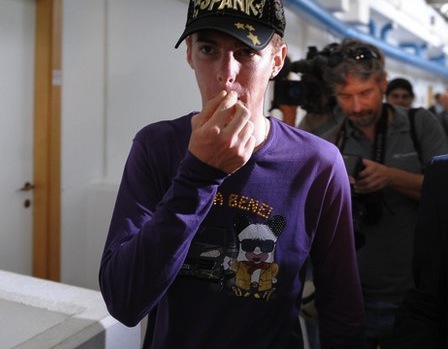Riccardo Ricco, aka the Cobra, was finally removed from the ability to race bicycles yesterday, by receiving a 12 year ban from the sport for autologous blood transfusing, from the Italian Anti-Doping Tribunal. Essentially, that means Riccardo can’t race until he’s 40. The guy such a goof-ball that I’d wouldn’t bet against him doing just that.
I don’t understand the doping sanctions anymore. Ricco gets 12 years for his 2nd positive. (He only served 20 months for his first EPO positive, after winning two stages of the Tour de France.) What did Tyler Hamilton get, 8 years? And Dewey gets a lifetime ban? I don’t get it. And I don’t have enough energy to try to figure it out. It seems wrong and disjointed. But, such is the way with most sanctions in life.
Anyway, the system finally, sort of worked. I’ve said it here before and I’ll say it again-the whole doping control process needs to be completely revamped. From the testing to the method for sanctioning. And, of course, the sanctioning penalties of course. It is a broken system that is not doing much to deter the practice.






Maybe cheating would decline (not cease) if sponsors were no longer allowed in the sport. Kind of like when parents get asked to be quiet when attending their child’s little league game. Game changer, and possibly game over.
Maybe cheating would decline (not cease) if sponsors were no longer allowed in the sport. Similar to when parents get asked to be quiet when attending their child’s little league game. Game changer, and possibly game over.
The UCI is our metaphorical honey badger, eating the cobra? To me, when I think bad ass, I think Steve.
If sponsors are no longer allowed in the sport, how will the trade teams be financed? Does this mean only national teams will remain?
Jeannie Golay won her first race on a cheap bike, lapped the field five times at a criterium … after that, she got sponsored, and that made her subsequent career possible. If you get rid of sponsors, you get rid of a lot of riders who otherwise could not possibly afford to compete. Getting rid of sponsors is no solution.
The only solution to the problem is to adopt a code of ethics – an honor code where riders pledge to not cheat and not tolerate cheating by others – like the code at the Citadel or Virginia Military Academy – and rigidly enforce it. First time caught doping, and you’re out for life, and you give back all of your prize money that you’ve won. Two riders on a team caught doping, and the team is done, for life – all of them, including the “doctors” and coaches. That would put an end to the practice, one way or another.
Either that, or since today is 4/20, all riders caught doping would be required to smoke an entire blunt before each race for the rest of their career…
It looks like Ricco is puffing on his albuterol in that photo.
So here’s what bothers me.
a. The benefit of all PEDs (blood doping, steroids, HGH, and EPO s), seems to be to improve recovery or shorten the time it takes to recover. The cyclist who cheats still has to do the workouts. The improvement isn’t instantaneious, it happens over weeks, months, or even years. And after using PEDs for an extended time, the cyclist is riding at a much higher level. The Pro cyclist is a better, stronger, faster Pro. Same thing for the amatuer.
b. The cyclist gets tested. Fails the test. Gets banned for 6 months, 2 years, whatever.
c. The cyclist continues training – but without competing. After the time lapses (6 months, 2 years, whatever), he starts competing again.
Now, is he performing at that better, stronger, faster level? Or is he the wimpy non-PED cyclist that the rest of us is.
Just Crusty – not true for blood doping, RBCs and EPO have a finite lifetime, hematocrit will decrease to normal levels: “Epo is highly glycosylated (40% of total molecular weight), with half-life in blood around 5 hours. Epo’s half-life may vary between endogenous and various recombinant versions. Additional glycosylation or other alterations of Epo via recombinant technology have led to the increase of Epo’s stability in blood (thus requiring less frequent injections).” http://en.wikipedia.org/wiki/Erythropoietin and
I`m with Steve. Ricco will probably come back to race Masters. I wonder if the Euro Grand Fondo`s and Sprotiv`s, have as rigorous dopage testing as the UCI
The NYC 5 Borough Bike Tour does